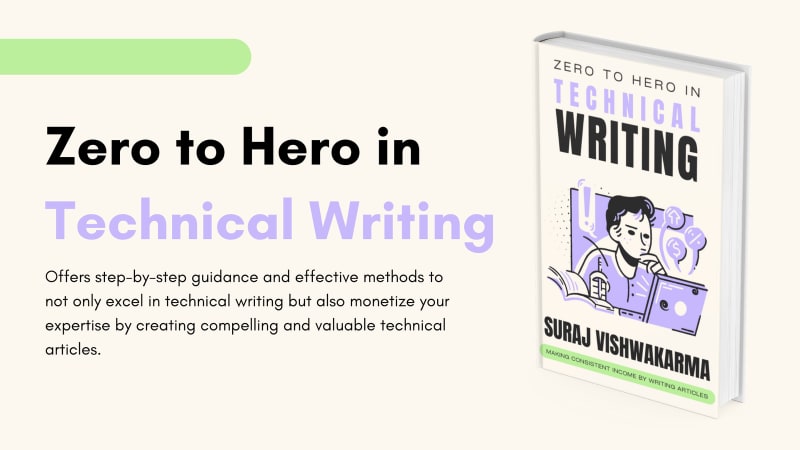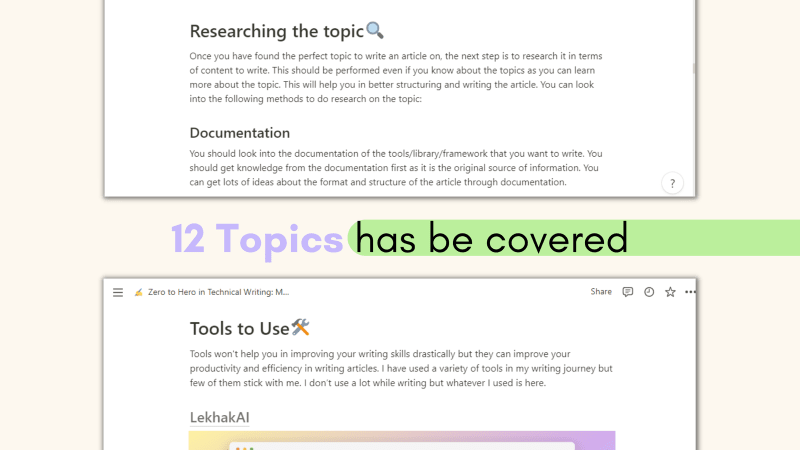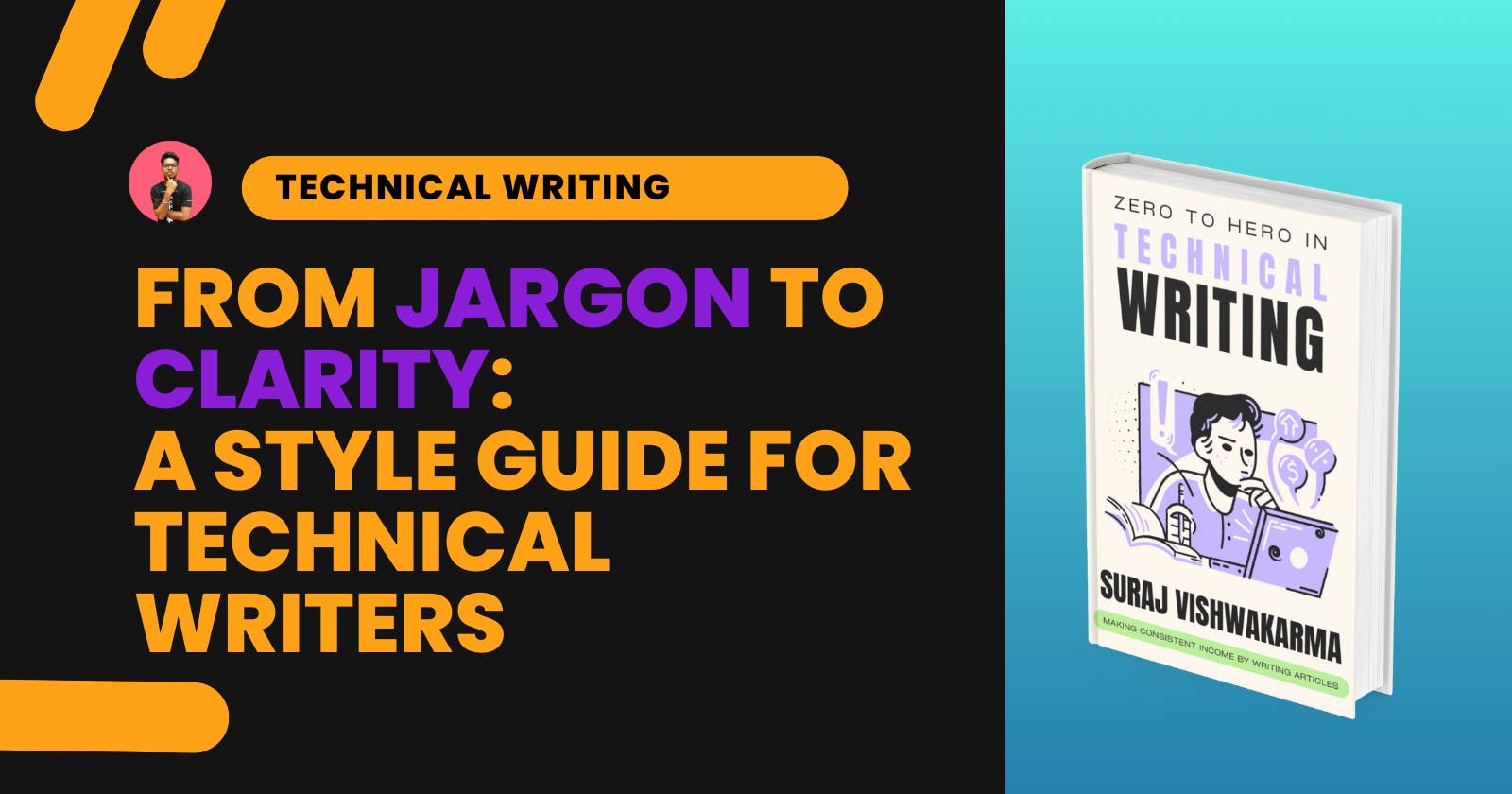Introduction
Writing technical articles is more than just a profession; it's a personal journey. Whether you're looking to earn some extra cash on the side, dive into it full-time, or simply share your coding insights and thoughts with the world, this path offers something for everyone. It's a chance for every developer to not only share their expertise but to also grow in their career.
I truly believe that every developer should try their hand at writing articles at least once. It's not just about putting words on a page; it's about connecting with others, sharing your journey, and learning along the way.
Technical writing requires a distinct writing style that focuses on clarity, conciseness, and accuracy. As a technical writer, your goal is to communicate complex information in a way that is easily understood by your target audience.
So, today we are going to look into some tips that can help in enhancing the quality of your writing when writing technical articles. Also, this is part of a section from my ebook, Zero to Hero in Technical Writing: Making Consistent Income. It covers topics related to writing technical articles online. Tips and tricks from my journey of writing articles. If you want to deep dive into writing technical articles then you should get the ebook. You can get the ebook here.

Now let’s get started.
1. Use Clear and Precise Language
Technical writing should be free from ambiguity and jargon. Use clear, straightforward language to convey your message effectively. Avoid unnecessary technical terms or acronyms unless they are widely understood within your specific industry or audience.
Remember, your goal is to educate and inform, not to overwhelm your reader with complex terminology. Strive for simplicity and precision in your explanations, making your content accessible to a broader audience.
2. Organize Information Logically
Present information in a logical and structured manner. Divide the complete article into different headings, sub-headings, and bullet points for better understanding. I see a lot of articles without headings and structure. It is quite hard for the reader to find a useful section.
Use these elements to guide your readers through the narrative, highlighting key points and making the text easier to scan. Remember, a well-structured article is like a well-planned journey: it takes the reader smoothly from start to finish, ensuring they don't get lost along the way.
3. Giving a gist of the article in the introduction
In the introduction section of the article, you can start with the reason for writing the article. You can also mention what your article will help with. This can hook the reader in the article. You should also mention the topics that you are going to cover. This will set the mind of the readers with the information that they are going to get. So that they don’t set any unrealistic expectations from the article.
A well-crafted introduction not only captivates but also aligns your readers' mindset with the journey you're about to take them on, ensuring a more engaged and satisfying reading experience.
4. Use code blocks effectively
As a technical writer, you will need to add code blocks to your article. Always mention the programming language to code blocks for proper syntax highlighting. In markdown, you can add this after adding triple backtick and then the name of the programming language. For instance,javascript for a code block of JavaScript.
Proper syntax highlighting not only adds a professional touch to your article but also aids in differentiating code from regular text, providing a more user-friendly experience for your audience.
5. Visualize Information
Complex technical concepts can often be better understood through visuals. Incorporate diagrams, charts, tables, and illustrations to supplement your text. Visual aids help readers grasp information more easily and enhance the overall clarity of your content. Try to add relevant images and screenshots to the article. Add proper captions to these images for accessibility purposes. Adding images will also increase the scrollable area of your article.
Integrating visuals effectively not only enhances comprehension but can also significantly increase reader retention, as visually appealing content is more likely to keep the audience engaged and encourage them to explore the article thoroughly.
6. Provide Context and Background
Always consider the knowledge level of your audience. Provide sufficient context and background information to ensure readers can follow along, even if they are not experts in the subject matter. You can add links to keywords to external articles so that readers can learn about it more. Strike a balance between assuming too much prior knowledge and over-explaining basic concepts.
Achieving this balance is key to creating an inclusive and informative article that resonates with a diverse audience, encouraging learning and exploration regardless of their starting point.
7. Proofread and Edit
Technical writing demands accuracy and precision. Pay attention to grammar, punctuation, and spelling. Use appropriate style guides and follow any established company or industry-specific guidelines. Proofread your work thoroughly to eliminate errors and ensure the highest quality of your writing. These can be achieved by reading the article once it is completed. This will let you find many errors that you miss while writing the article. Work on those errors. You can also use Grammarly to reduce grammar errors. And use hemingwayeditor for chopping lengthy sentences.

These tools not only improve the technical accuracy of your writing but also enhance readability, making your content more accessible and engaging for your audience. Remember, the quality of your writing reflects the quality of your content, so investing time in meticulous proofreading and utilizing these helpful tools can significantly elevate the impact of your article.
8. Making your article more beginner-friendly
I see lots of articles that are straightforward without explaining much of the code. I can understand sometimes it’s hard to explain everything. But at least, you should give links to other resources for further explanation. Make your articles beginner-friendly by explaining things from a perspective that might not know my keywords. This will also reach more developers.
Zero to Hero in Technical Writing: Making Consistent Income
This was just 1 topics among the 12 topics that I have covered in the ebook. The complete list of topics that I have covered are these:
Introduction👋
Why should you write technical articles?💡
How to start your blog?🌱
What should you write?🤔
Researching the topic🔍
Writing style to follow🎨
Markdown📄
Things to do before publishing the article📑
Things to do after publishing the article📢
Tools to Use🛠️
Challenges of Writing Technical Articles📚
Earning money through Technical Writing💰

If this excites you then you should look at the ebook here. It is available in ebook PDF and Notion template variants. You can get the ebook here.
Conclusion
As a technical writer, your primary focus should be on providing accurate, concise, and easily understandable information. By adopting a clear, organized, and reader-centric writing style, you can effectively communicate complex technical concepts to your intended audience.
If you have more tips to add to this then please mention those in the discussion/comment section. I hope this article has providing knowledge that will be helpful in writing your next article. Thanks for reading the article.
